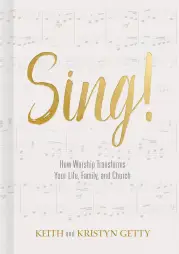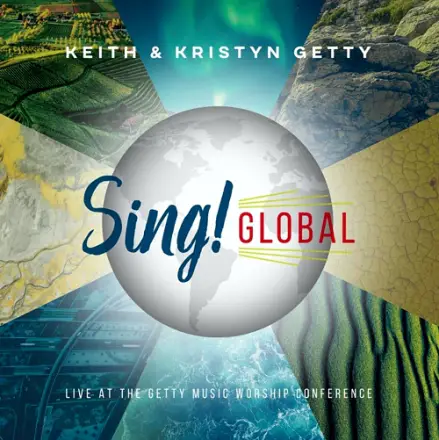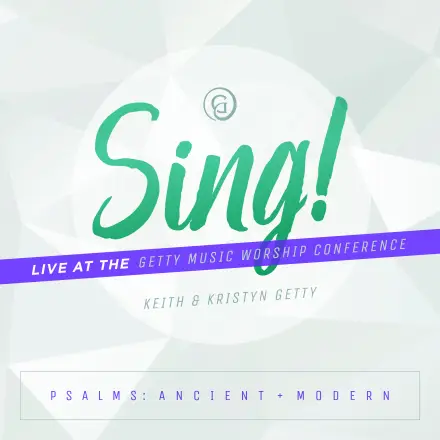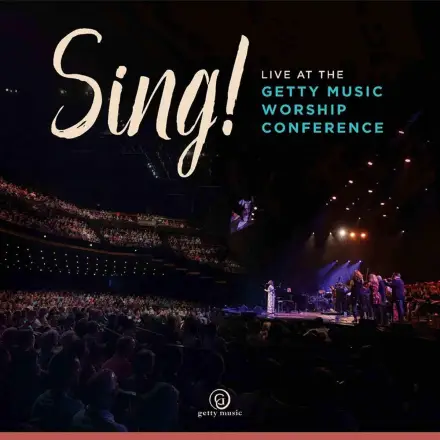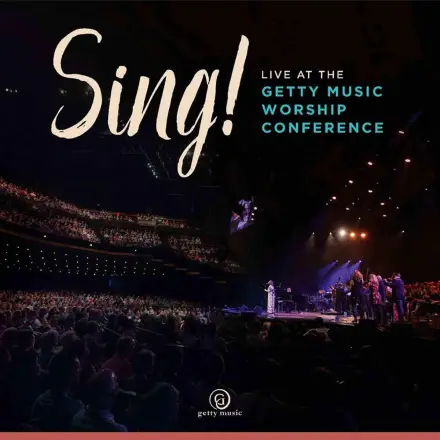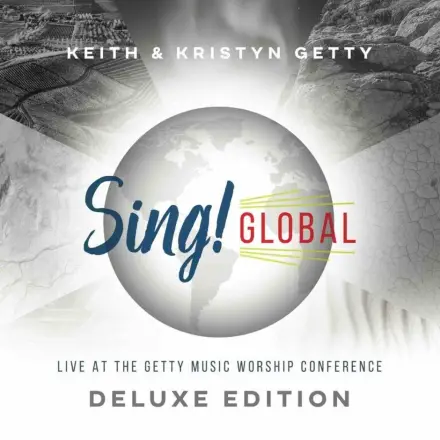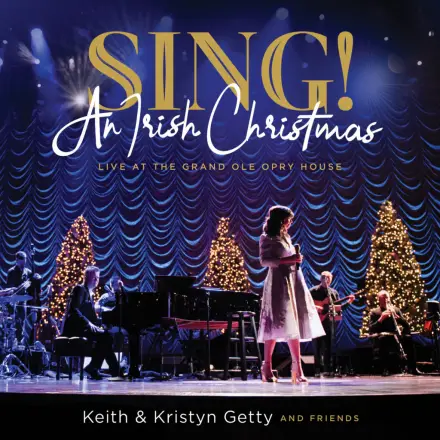Sing!
It should surprise no one that Keith & Kristyn Getty are passionate about singing – after all, they are two of the most well–known modern hymn–writers. However, their new book, ‘Sing! How Worship Transforms Your Life, Family & Church’, may surprise you in that it isn’t an account of their success, or the basics of how to write a popular worship song. Rather, it is a missional and biblical look at why singing is such a hugely necessary part of the Christian life – whether you can hold a tune or not! Beginning with Martin Luther (a very good place to start!), the book first looks at why worshipful singing should be an instinctive reaction to becoming a Christian. It then spends several chapters discussing simple ways to infuse your entire life with singing in praise; from the shower, to the school run, to Sunday morning services. Finally, the four somewhat affectedly–titled ‘Bonus Tracks’ pull no punches in advising those involved in leading church worship on how to make sure your singing is welcoming, accessible and most of all, God–focused.
‘Sing!’ is a great little book for anyone who values the use of vocal music in the worship of Jesus our Saviour. It is also short, and very easygoing – I read it in its entirety on a transatlantic flight, with plenty of distractions!
Miriam Montgomery
Sing!
“Sing!” is a short book, “…about singing together as the church in a way that impacts all of your life.” (p. xxii) The goals of the book are stated on p. xxiv:
1. To discover why we sing and the overwhelming joy and holy privilege that comes with singing
2. To consider how singing impacts our hearts and minds and all of our lives
3. To cultivate a culture of family singing in our daily home life
4. To equip our churches for wholeheartedly singing to the Lord and one another as an expression of unity
5. To inspire us to see congregational singing as a radical witness to the world
In our group review we discussed the book under three big areas:
Encouragements we were thankful for
Questions we had
Wisdom that we’d like to apply in our settings
Here’s a summary of our thoughts:
Encouragements
Commitment to rich congregational singing in the local church
Without a doubt, this was the big encouragement from the book. What is crystal clear is that the authors have a passion for the voice of the congregation, and are aware of the biblical importance of singing together as local churches. On top of that, their desire to promote deep lyrics rooted in rich truth from God’s word is commendable.
If you or your church need more convincing of the need for rich congregational singing (not just from the band at the front) by those who work hard to serve that goal with their songs, then the Getty’s book is a humble and helpful tonic:
“We live in a time when the importance of music in church has been elevated greatly (not least because it has become commercially lucrative). But at the same time, we are in danger of lowering the importance we place on singing together. Listening to each other mumbling quietly along as a band performs brilliantly on stage in a church building is not the same as singing together as a congregation…” (pp. 72–73)
Desire to connect individual and family singing with congregational singing
Perhaps the unique contribution of this book to the discussion on biblical singing is its desire to encourage the deployment of singing in the lives of individual Christians and in Christian families. The Gettys demonstrate the potential symbiotic nature of this, encouraging believers to be singing the songs they sang on Sunday during the week, encouraging families to sing gospel truth together, and so on.
If you’re wondering how to encourage the families in your church to sing more together, or to help your congregation to prepare well to sing on Sundays, then the Gettys serve up some food for thought:
“Let singing be to your family what skiing incredibly early and speaking multiple languages is to the Swiss. We need to make singing Bible truths second nature to our children, a ‘second language’ in our homes. Sing about those truths when you sit at home and when you walk along the road, when you lie down, and when you get up.” (p. 56)
Cultural insight and wisdom
It was refreshing to read the wise reflections of front–line practitioners who are self–aware and not afraid of critiquing assumptions that underly some of how music is employed (or not) in church life. There is wisdom here on what really will help our teenagers, and what really will help the unbeliever in our midst:
“Are we communicating a deep faith through what we sing and how we sing it, or are we entertaining teenagers with something that will not hold water when they hit college or head out into the workplace? … Biblically rich content in songs, sung by people who look like they mean what they are saying, helps teach the gospel as something that is credible and powerful rather than cultural and optional.” (p. 78)
On their song, ‘In Christ Alone’…
“…being vague and gospel–lite in congregational songs is not the way to be ‘seeker–friendly’. Communicating the gospel in a way that informs the mind and engages the emotions is. The gospel is the church’s central lyrical distinctive. We should not be shy about it. As you stand in your church this Sunday, you do not know who is listening…” (p. 91)
Accessible to the whole congregation
As music directors of churches, we’re aware that we read a lot of books about singing and about worship, and about the theology of such things. However, it is rare to find a book that we feel we can put into the hands of our church members straight away, knowing that it is short, accessible, practical, and (if heeded) should bring about clear changes in thinking and in practice. “Sing!” is therefore a helpful tool, and we’re thankful for it.
Questions
The positive side of brief books like “Sing!” is their accessibility and punchiness. Sometimes this left us with questions about how singing is talked about biblically, and whether more depth would have brought some sharpness to things.
In the authors’ passion to communicate the wonderful God–given power of singing in the local church, there are occasions when we wondered whether the power to achieve all these great things was being ascribed to singing itself, or more clearly to the word of God dwelling in his people richly through singing (cf. Col 3:16).
For example, we would want to maintain (as I’m sure the authors would themselves) that singing in and of itself doesn’t save anyone. Nor is singing in and of itself the thing that grows believers.
We think they are talking about the redeemed people of God (i.e. the church), when on page 8 they say:
“It is an incredible thing that we, the created ones, have been given a way to communicate with the One who made us. We sing knowing that our Lord’s ears are open and listening as we lift our voices to Him…”
But given that this comes from the chapter, “Created to Sing,” this could be clearer. There is, perhaps, a slight conflation of creation, fall, and redemption going on where we could be left thinking that God hears our song because we’re created in his image, rather than because we are re–created in Christ (cf. Amos 5–6).
In one or two other places we applauded the Getty’s desire to be driven by God’s word but wondered if the passage being employed was being rightly applied to singing, for example (p. 22), 2 Cor 5:14–15, “For Christ’s love compels us…” coming from the context of Paul’s description of new covenant gospel ministry. And with the treatment of Deuteronomy 6 (see above quote from p. 56 on singing as a family), again, we thought it may be stretching it to say that “taking this command seriously includes singing the songs of faith in the home” (p. 53), given that the imperative from Deut 6:7 is “talk about them” rather than especially ‘sing about them’.
We minister to a range of people in our congregations, some of whom naturally love to sing. For the others who would be very reticent to sing in church, let alone in their homes with their families, we wondered if Deuteronomy 6 was the place to go in order to most helpfully encourage them.
These quibbles aside, we were positive and thankful for the book in our reflections together, and were keen to make us of it in the following ways:
Application
In our churches
Some of us are looking into making this the book of the term or book of the month for our churches. We’d love the message of it to take root and for our congregations to know that:
Every time you sing, you are expressing something about what kind of church you want to be, and what kind of church member you are going to be.” (p. 80)
With our music teams
A huge strength of the book is the practical sections at the end that really help get everyone singing off the same hymn sheet – pastors, music teams, tech teams, congregation.
As well as being an easy ready for congregations, it’s an easy read for music teams. And we want them to be reminded of things like this:
“Primarily and fundamentally, you are there to help God’s people sing. It is not a restriction or reduction of your talent to do so – you put loving your neighbour as yourself into practice as you help God’s family sing. Only fools think their artistry is more important than serving the congregation.” (p. 125)
As songwriters
Anyone who seeks to write songs for churches will do well to reflect on the honed skills and the humility of the Gettys:
“If you are a songwriter for the church, you bear part of the responsibility for the canon of songs your church sings. It is your responsibility to make sure the lyrics are as excellent and true and life–giving as you can possibly make them.” (p. 137)
“The reality television generation has suggested that unless you gain instant fame and wealth, your music has somehow not reached its potential. This is a breeding ground for bitterness and discontent. So you need to maintain realistic expectations.” (p. 136)
A huge thank you to Keith and Kristyn Getty and their publishers for this book, and the way it is backed up by the Getty’s ministry that serves many local churches faithfully and well.
“Sing! How Worship Transforms Your Life, Family, and Church” (Nashville, B&H, 2017) is available here at 10ofthose, who will do you some super discounts if you buy in bulk.
Music Leaders Termly Training is a daytime gathering in central London of those involved in full or part–time music ministry. Find out more here, and contact us if you’d be interested in joining our next session.
Andrew McKenna
Sing!
Yes, a very helpful and encouraging book as far as it goes. Certainly, the book provoked me to look further at the many biblical references to singing - and perhaps it would be useful to list the many references.
However, several areas appeared to be missing: Firstly, the rich heritage of hymns, particularly after the Reformation, provide us with a depth of wisdom and experience that most of us would find difficult to articulate. And yet, through the repeated singing of these profound hymns, we can begin to internalise and reflect upon the greatest of theological issues. And, of course, we are memorising beautiful Godly words and phrases which would not be regular parts of our daily vocabulary. Secondly, as a writer and student hymnist, I feel that often there is a lack of awareness or respect for these hymns which are genuinely Holy Spirit inspired. Time and time again we read of authors who have suddenly experienced the Holy Spirit's inspiration to suddenly write verse upon verse without hesitation. They write of experiences of the words 'just flowing from my pen'. Thirdly, there is the whole issue of harmonies and parts-singing. Almost all human beings are gifted with voices but we do not all sing in the same register. I love the rich harmonies of so many of our classic hymn-tunes and bewail the fact that very few people are willing to sing the alto line of classic 4-part harmonies. And yet it is the alto line which is the very 'anchor' that binds the soprano line to that of the tenors and basses and thus enables the male voices to pluck up the courage to sing their parts 'poco maestoso'. Finally, an observation concerning public concerts: I also sing in a choir both as a choir-member and as a soloist. Yet one thing concerns me, that of audiences who applaud the performances as if what they were watching was a stage-show rather than hearing the proclamation of the Holy Gospel. Maybe it's because the authors are American but I can't help feeling that there is a cultural difference that needs to be addressed?
Ray Tolley
